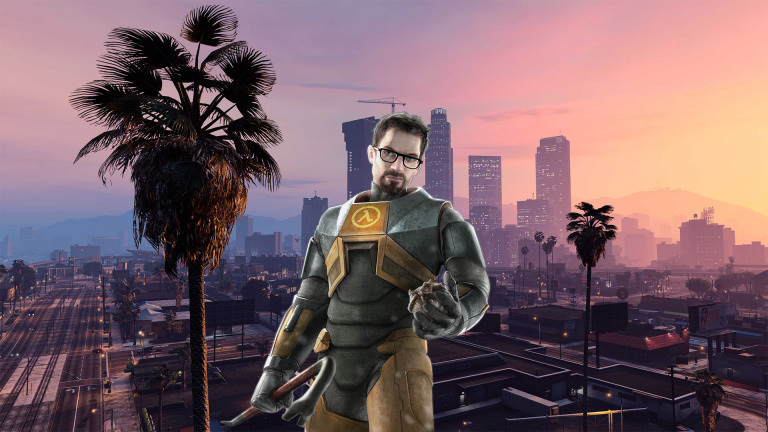This weekend Rockstar Games fell victim to a hack which led to a huge leak of GTA 6 videos. Showcasing the game in in-development builds, they were uploaded by a hacker who then demanded money from Rockstar not to release the source codes for GTA 5 and 6.
GTA 6: the pirate soon tracked down by the FBI?
A situation that has provoked many reactions, including the publication of many working versions of Cult of the Lamb, Immortality, Horizon: Zero Dawn or even God of War, Marvel’s Spider-Man and The Last of Us. The goal, to show that the leaked videos are very far from representing a game when it is put on the market. For its part, Rockstar Games expressed its sorrow to see its work thus exposed, but indicated that the work would continue normally. But from a legal point of view, it is out of the question to let the hacker get away with it, especially since there is an attempt at extortion behind all this.
Here’s a prototype for the first boss fight against Baldur in God of War (2018). Watch until the end to see the difference. This is totally normal stuff – anyone saying otherwise doesn’t have a clue what they’re on about pic.twitter.com/qVlMnBR74S
— Cian Maher (@cianmaher0) September 20, 2022
Last week, Uber was targeted by an attack, and Uber believes the same person was involved in the attack on Rockstar. A situation that could push the FBI, working on the Uber case, to take control of the attack suffered by the developers of Grand Theft Auto VI. This isn’t the first time the FBI has been involved, and the whole story around the massive GTA 6 leak has brought up another story, related to Half-Life 2.
Video game and FBI: back on the story of the one who stole Half-Life 2
In 2003-2004, almost 19 years ago a leak had shaken Valve and Half-Life 2. A young german hacker a 21-year-old named Axel Gembe, manages to code a formidable malware, and to break into Valve systems to observe the development of the long-awaited Half-Life 2. During six months, without being spotted, he watches everything that happens. During these months of espionage, he get the source code of the game and send it to a trusted person.
I basically had the keys to the kingdom. I did not reflect (…) There was, of course, an idea of boasting. But the person I shared the code with assured me that he would keep it to himself. He didn’t, he told Eurogamer in 2019
In September 2003, everything leaked on the internet and let the world find out that the game is way behind. Bad publicity is done. In February 2004, Axel Gembe, known as Da Guy, claims the intrusion himself by sending an email to Gabe Newell, the boss of Valve. He indicates that he did not do this only to observe the development of the game, and that he never intended to cause problems for Valve. In a second email, Gembe asked, naively he said, if Valve was interested in his skills in order to get a job.
It was and still is my dream to work for a game development company, so I just asked. I was hoping they could forgive me for what I did, mostly because it wasn’t intentional.
A fake job interview to attract the hacker to the United States
Gabe Newell saw an opportunity, and started chatting with the young pirate. But behind the scenes Newell and the FBI work together to trap the intruder. The interview took place by telephone and in a completely traditional way, in order to come up with a proposal to meet at Valve’s headquarters, in Seattle. Bringing Axel Gembe is the assurance of being able stop him the second he sets foot on American soil. But complications related to obtaining visas and the security of Valve’s servers prompted the FBI to abandon the trap in May 2004.
as you like the federal agency contacted the German police, who wasted no time in disembarking armed at the pirate’s home. Taken to the station, we make him understand he’s lucky he didn’t get on the plane, because the situation would have been much more tense for him. In the end, the young man did rather well, with a 7 hour trial and a sentence to two-year suspended prison sentence. In 2011, he sent a new message to Gabe Newell, stating:
I’m really sorry for what I did to you. I never meant to hurt you. If I could go back, I would (…) You are my favorite developer, and I will always buy your games.
In the end, all’s well that ends well, because the hacker put this story aside and is now developing security applications for Windows. Valve certainly lost millions of dollars in 2004, but Half-Life 2 sold nearly 4 million copies within three years that followed its release, and acquired cult status.
For GTA 6, we will have to wait many more months before discovering what the developers of Rockstar really have in store for us, and probably even more before you have it in your hands. We know that the ambitions are enormous, which is essential to hope, one day, exceed GTA V and its 170 million copies sold.

